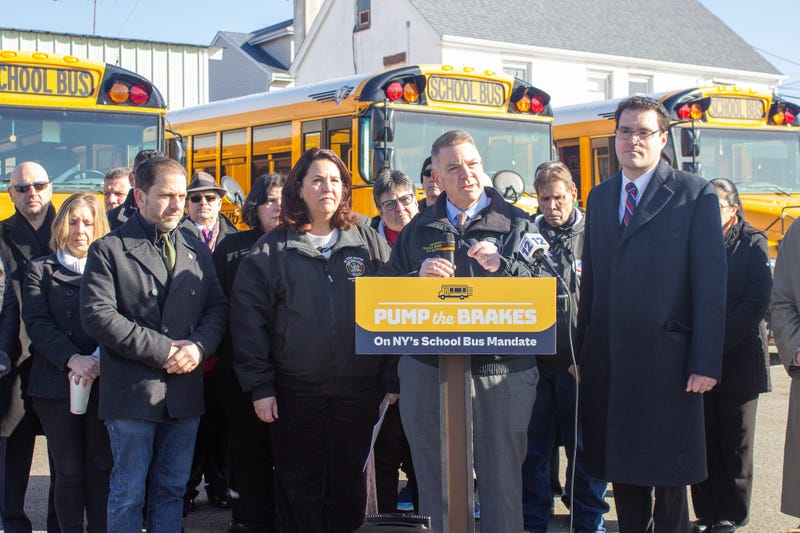
NEW YORK (1010 WINS/WCBS 880) — Gov. Kathy Hochul’s mandate that New York state transition to zero-emission school buses by 2035 is being challenged by some State Senate Republicans and local officials who believe the transition is neither feasible nor affordable on its current timeline.
State Senator Steven Rhoads, State Senator Patricia Canzoneri-Fitzpatrick, local elected officials, fire officials and school district officials gathered in Levittown on Long Island Sunday morning to call for a decelerated timeline on the state mandate.
The measure, which was passed in the 2022-2023 NY State budget, would require all school buses in the state to be replaced by electric vehicles by July 1, 2035, and bar districts from purchasing diesel-fueled buses after July 1, 2027.
“We’re asking the Governor to pump the breaks,” Rhoads told 1010 WINS/WCBS 880. “Let’s slow this process down, let’s actually have the state Education Department do a cost analysis, so that we can do a full breakdown of what it’s going to cost bus companies, what it’s going to cost school districts to be able to implement this plan and figure out a solution that gets us to the ultimate goal in a time frame that is realistic and safe.”
At Sunday’s press conference, surrounded by 80 school buses in the Levittown bus depot, Rhoads stated that an electric school bus will cost between $400,000 and $450,000, compared to $145,000 for diesel-run vehicles.
The senator acknowledged this as a significant financial burden for districts, stating that even if a district doesn’t maintain a fleet itself, it will be contracting with a company to provide those bus services at an elevated price, and will have to account for the necessary training that relevant personnel will need to work with the new electric vehicles.
Rhoads also pointed to the technological challenges the mandate brings, questioning if the state’s current electrical grid could handle the power needed to charge and maintain fleets of electric vehicles at this scale.
According to Rhoads, NY currently has 50,000 school buses across the state, and lacks the infrastructure necessary for a one-to-one transition to electric buses in the next 11 years.
Canzoneri-Fitzpatrick backed up Rhoads’ concerns, adding that meeting the financial requirements of the state plan would fall on taxpayers.
“As a former Village official, I understand all too well that unfunded mandates can cripple a community. Because we have to comply, and if the Governor is not giving us the funding in the budget, it has to come out of the taxpayers,” Canzoneri-Fitzpatrick said Sunday.
She also argued for the implementation of an electric school bus pilot program to ensure that the electric vehicles, which utilize lithium-ion batteries, would be safe to transport children.
Rhoads pointed to this same hazard, citing a rise in dangerous fires caused by lithium-ion batteries, before introducing Nassau County Chief Fire Marshal Michael Uttaro to the podium.
“From a fire safety and codes and standards viewpoint, again, we’re asking to allow the codes to catch up to this first,” he said.
“Allow us to work with professionals in the industry, from the EV industry, and other infrastructure experts, to find a way to control these fires and find a way to suppress these fire and early detect these fires to give our firefighters, and also the kids and the people that ride these buses, a fighting chance if one of these buses does catch on fire,” Uttaro added.
On Nov. 29, Hochul announced $100 million in funding for zero-emission school buses under the Clean Water, Clean Air and Green Jobs Environmental Bond Act of 2022 in an effort to make the buses, and associated infrastructure, more affordable for school districts and the bus operators that contract with them.
“New York State is empowering school districts to embrace zero-emission school buses which will provide our leaders of tomorrow with healthy and clean transportation today,” Hochul said when the funding was announced. “Ensuring electric school buses are at the forefront of student transport is a critical health investment and demonstrates the benefits of clean energy while reducing harmful emissions to improve air quality and protect our precious environment.”
In addition to the $100 million, the Bond Act itself allocated $400 million to zero-emission buses. Canzoneri-Fitzpatrick doesn’t think it’s enough.
“At $400,000 roughly, that’s about 1,250 buses,” she said Sunday. “Doesn’t pay for the infrastructure, doesn’t pay for the charging stations, doesn’t pay for any of the personnel that now needs to be trained on these new, electric buses. 1,250 buses.”
Opponents to the zero-emission school bus mandate maintained their support for efforts to reduce emissions and create a cleaner environment, but emphasized that the current goal lacks the proper consideration.
“If I have to balance climate change with the safety of our children, the safety of our children is going to win every day,” Canzoneri-Fitzpatrick said.
